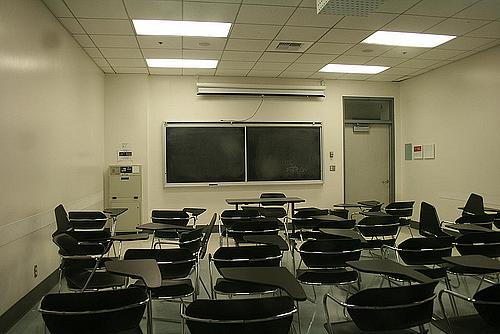Office Hours: Journalism professors discuss specializing in health

Should student journalists consider specializing in health? This week in Career GPS, we ask journalism professors what they tell their students about journalism, specialization and the job market ahead.
"I believe the distinction between the health and science beats is arbitrary and artificial," says Linden.
McKay Jenkins teaches journalism, literature and environmental humanities and is the Director of Journalism at the University of Delaware. In his courses, he also takes a broad approach to health. He encourages his students to think and write about the relationships between the products we use, our environment and our health. Students have become increasingly interested in this broader-than-health-care conception of health, he told me in an email. But there is not always a straight path into specialized journalism:
I teach journalism in the context of an English department rather than a journalism school, so we are most interested in training students to use their critical thinking and writing skills in whatever journalistic pursuit they care to pursue. I have a colleague who teaches traditional newspaper-style medical reporting; my work is more in long-form narrative nonfiction and essay writing. Our hope is that those who want to get into medical reporting will do so, and others will use their training to become better journalists regardless of their field.
Our students are having luck finding work, mostly at regional newspapers and some magazines. Specialization is a toss-up - it works for some, but others are hired into general assignment jobs and make their way to their specialty after they're hired.
Willa Seidenberg, director of Annenberg Radio News and Intersections South LA at the USC Annenberg School for Communication & Journalism (the home of the California Endowment Health Journalism Fellowships that runs this site) says that students need to "be good journalists" who are "able to cover any story thrown at them." But because there is a market for niche journalism, having experience and knowledge about health can only help, she wrote in an email. Students who want to specialize, she says, will be most marketable if they can be generalists as well.
Patricia Thomas taught the first health and medical journalism course at the University of Georgia's Grady College in 2006. She is now the Knight Chair of their two-year-old health and medical journalism program, which is designed for students who choose to specialize. "For them, everything is a health story," she writes in an email. "Education, employment, transportation, land use, law enforcement, criminal justice - all these beats involve health."
Four of Thomas' students in health and medicine are working as science writers or university-based magazine staff members. "We also have a grant from the Healthcare Georgia Foundation that supports student reporting for a statewide public health news bureau, which pushes their stories out to print, online and broadcast news outlets throughout the state, and to Georgia Health News," she writes. "They are paid for their stories and the stories are distributed widely."
Thomas has an optimistic view of her students' prospects in the job market. Her best advice?
For starters, I tell them that the sky is not falling. When I graduated from journalism school (Stanford, early 1970s) the prospects were said to be bad for journalists. But I built a freelance business and worked for myself longer than for any employer, before I made the jump to teaching. So I don't buy into doom.
Thomas tells her students to emphasize their multimedia skills in their job searches. Linden agrees. He wrote in an email:
If you want to work as a health/medical reporter for a mass media news organization, then you need to be an excellent writer and have multimedia skills. You need to be able write clearly, report accurately and know how to shoot good video and capture clean audio. If you don't have all these skills, you'll be at a huge disadvantage when you enter the job market. Clearly there are more job opportunities in the health/medical communication field, but there's still a demand for skilled journalists who can perform at a high level in the digital world.
(Photo "The Classroom" by Christian Ventura on Flickr Creative Commons)
Read more from Career GPS about Tom Linden's career, specializing in health broadcast journalism, and a photojournalist who went back to school.

